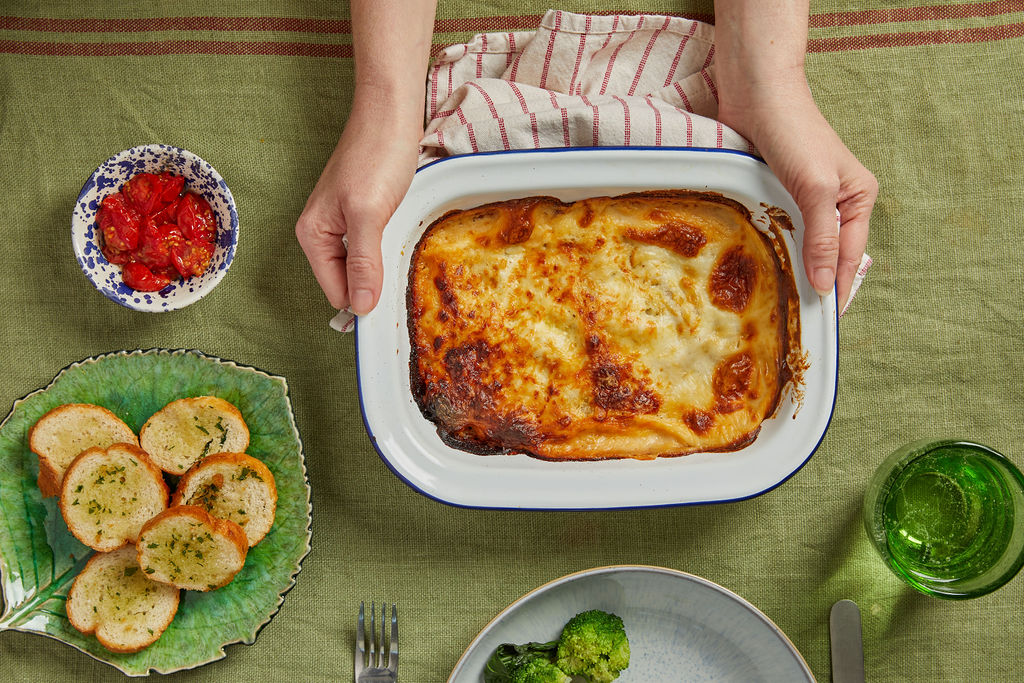We chat to outdoor play expert Claire from Creative Play, who shares how imaginative play can support early years development…
SPONSORED CONTENT Your menu is your marketing: How nursery menus can help you stand out in a competitive market

As a nursery owner, every detail matters when it comes to standing out from the competition—your facilities, your staff, your curriculum, and how you communicate with parents. However, there’s one key element that is often underestimated in its importance: your menu.
Today’s parents are more discerning than ever about the food their children eat, particularly during the critical early years of growth and development. Concerns about sugar content, food allergies, and balanced nutrition mean that your nursery’s approach to meals can either build trust—or prompt parents to look elsewhere.
The 2024 Government Guidelines, titled ‘Example Menus for Early Years Settings in England’, provide valuable guidance and sample menus to help early years providers meet the welfare requirements for food and drink outlined in the Early Years Foundation Stage (EYFS).
At Lune & Wild, whose menus and recipes are carefully designed to meet these government guidelines, their meals are created in collaboration with Paediatric Nutritionists and Dietitians to ensure they meet the nutritional needs of young children while aligning with the EYFS requirements.
In this blog, we’ll explore what parents prioritise in nursery menus and how carefully considered food choices, like those from Lune & Wild, can transform your menu into your secret marketing advantage.
Why Your Menu Matters More Than Ever.
The First 1,000 Days: Food’s Crucial Role in Development
The first 1,000 days of a child’s life—from conception to their second birthday—lay the foundation for lifelong health and well-being. Nutrition during this time supports physical growth, brain development, and the establishment of healthy habits.
Studies show that proper nutrition in this window of time has a profound impact on cognitive development, immune function, and the risk of chronic diseases later in life. For example, a landmark paper by Victora et al. (2008) published in The Lancet found that inadequate nutrition during the first 2 years of life is associated with poor educational outcomes, reduced earning potential, and a higher likelihood of health complications in adulthood.
Paediatric Nutritionist Judith Lynn from Little Monkey Nutrition explains:
“The food children eat in their early years doesn’t just fuel their energy for the day—it builds the foundation for their brain development, immune system, and long-term eating behaviours. A nursery menu must provide a variety of whole, nutrient-dense foods with diverse colours, textures, and flavours to support their growth as well as sensory and cognitive development.”
Emerging research also highlights the link between early dietary diversity and the development of healthy eating habits later in life. A study published in Nutrients (2020) by Switkowski et al. emphasises that exposing young children to a wide variety of fruits, vegetables, and grains helps shape their taste preferences and reduces the likelihood of picky eating in later years.
For many children, nurseries provide the majority of their daily calories. This makes your role as a nursery owner crucial—not only for nourishing children but for instilling lifelong healthy eating habits. By offering meals rich in whole foods, balanced nutrients, and minimal sugar, you contribute to their optimal development while supporting their future health.
Sugar Consumption in the Spotlight
The harmful effects of sugar are widely recognised, with headlines regularly warning of its links to childhood obesity, behavioural issues, and even dental problems. Parents today are vigilant about avoiding not just obvious sugar sources but also hidden sugars in processed foods.
Studies show that early dietary choices have a long-lasting impact on a child’s ability to manage sugar intake later in life. For example, a Nutrition Bulletin by Chambers (2019) by the British Nutrition Foundation shows that introducing vegetables first, rather than fruits or sweetened foods, when starting solids can help shape a child’s palate and reduce their preference for sweet foods. This approach is linked to healthier eating patterns in early childhood and can be an effective strategy in curbing the development of a sugar dependency.
Judith Lynn explains the impact:
“Excess sugar in young children’s diets can lead to energy spikes and crashes, poor focus, and increased risk of weight-related health issues later in life. A well-designed nursery menu will focus on natural, unprocessed foods prioritising nutrient-dense foods containing natural fats and fibre and ensure sugar intake is minimal.”
A menu free from added sugars and low in natural sugars can set your nursery apart by reassuring parents that you prioritise their child’s health, providing them with a foundation for a lifetime of healthier eating habits. Lune and Wild have listened to this research and prioritise vegetables, plants and natural fats in their weaning recipes, only introducing fruits and sweeter foods as a baby gets older for diversity of flavour.
Allergies on the Rise: Managing Risk and Reassurance
With food allergies affecting approximately 7% of children in the UK, parents are increasingly concerned about safety and inclusivity in nursery menus. Transparency, robust allergy management, and clear communication are essential to building trust.
Judith Lynn highlights the importance of inclusivity:
“A good nursery menu doesn’t just cater to the majority—it ensures that every child feels included and safe, regardless of dietary restrictions. Thoughtful planning and allergen management demonstrate a commitment to the well-being of all children.”
Providing an inclusive menu doesn’t mean compromising on variety or flavour—it’s an opportunity to show parents that your nursery cares about their unique needs.
How Lune & Wild Sets the Standard for Nursery Menus
At Lune & Wild, we believe that food is more than fuel—it’s a cornerstone of growth, learning, and development. That’s why we work with expert paediatric nutritionists to craft menus that meet the highest standards for nursery settings. Here’s how we align with what parents and professionals expect:
1. Plant Diversity and Whole Foods
A diverse diet isn’t just about offering variety—it’s key to supporting gut health and overall well-being. Research shows that consuming a range of plants supports a healthy gut microbiome, which is essential for digestion and immunity.
Judith Lynn explains:
“Introducing children to a variety of plant-based foods early in life promotes gut health and helps them develop a broad palate. Wholegrains are an excellent source of insoluble fibre which is fuel for good bacteria growing and maturing in a baby’s gut, it also provides B vitamins and minerals for growth of their nervous system. Fruits and vegetables provide a source of vitamins A, C and E supporting development of their immune system as well as helping with iron absorption and growth of collagen and skin.”
Lune & Wild’s menus include an impressive 40 different plants and whole foods each week, from carrots and kale to lentils and quinoa. By incorporating this diversity, we help children develop a taste for nutrient-rich foods while ensuring their diets are packed with the vitamins and minerals they need to thrive.
2. Naturally Low in Sugar
Many parents are surprised to learn how much sugar is present in natural sources like fruit. At Lune & Wild, we carefully design our meals to keep sugar levels low without sacrificing flavour.
Judith Lynn emphasizes:
“Reducing sugar intake during early childhood is one of the best ways to promote stable energy levels, better focus, and a reduced risk of metabolic issues. Meals should focus on slow-release carbohydrates and healthy fats to sustain energy throughout the day.”
By using ingredients like whole grains, vegetables, and natural herbs and spices, we create delicious meals that are naturally sweetened without relying on excessive fruit or added sugars.
3. Expertly Balanced Meals
Every meal from Lune & Wild is created in collaboration with paediatric dietitians and nutritionists to ensure it meets the unique needs of young children. We consider everything from portion sizes to protein and fat content, ensuring meals are balanced and nourishing.
Judith Lynn says:
“A child’s diet needs to include the right balance of protein, healthy fats, and complex carbohydrates to support growth, brain development, and sustained energy. Menus crafted with these principles help children feel satisfied and energized for learning and play.”
From protein-packed Lentil Shepherds Pie to Salmon Fish fingers with root veg mash and peas, our meals deliver the nutrients children need to thrive, ensuring parents feel confident in their child’s diet at nursery.
4. Allergy-Inclusive Menus
Catering to allergies and dietary needs can feel daunting, but it’s critical to ensuring all children feel safe and included.
Judith Lynn highlights the importance of transparency:
“Parents of children with allergies need reassurance that their child’s food is safe. Clear labelling, robust processes, and a willingness to adapt menus are key to earning their trust.”
At Lune & Wild, we take allergies seriously, offering allergy-aware menus with transparent ingredient lists and rigorous safety protocols. This means no child feels excluded, and parents can rest easy knowing their child is in good hands.
Why Your Menu Is a Marketing Opportunity
Your menu isn’t just a list of meals—it’s a statement about your nursery’s values. Here’s how to use your menu to build trust and stand out from the competition:
1. Share It Proudly
Parents want to see exactly what their children will be eating. Make your menu a highlight of your nursery tours, website, and newsletters. Highlight features like plant diversity, low sugar levels, and allergy inclusivity to show parents you’ve thought about the details that matter.
2. Partner with Experts
Running a nursery is demanding, and you can’t be an expert in everything. Partnering with Lune & Wild allows you to leverage our expertise in children’s nutrition while focusing on other aspects of your business.
Judith Lynn adds:
“Working with a partner who understands paediatric nutrition ensures that your menu meets high standards while saving you time and stress. It’s a win-win for both nurseries and parents.”
3. Be a Resource for Families
Parents appreciate nurseries that go beyond childcare to support their family life. Share simple recipes, nutrition tips, and resources to help parents maintain healthy eating habits at home.
Lune & Wild offers meals from babies, toddlers and even family meal options, giving families a chance to enjoy the same balanced nutrition at home as their child experiences at nursery.
Key Takeaways
In today’s competitive childcare landscape, a thoughtful, well-crafted menu can set your nursery apart by:
- Demonstrating your commitment to children’s health and development.
- Building trust with parents through transparency, inclusivity, and expert-backed nutrition.
- Highlighting your nursery’s values and attention to detail.
With Lune & Wild’s support, creating a standout menu has never been easier. Together, we can help your nursery become a place where children grow, learn, and thrive—one delicious bite at a time

Latest Features
The roll-out of new innovations doesn't always go to plan. Ben Case, education advisor at childhood education platform Tapestry, sets…
We discover how RafaKidz Medmenham transformed its outdoor space




